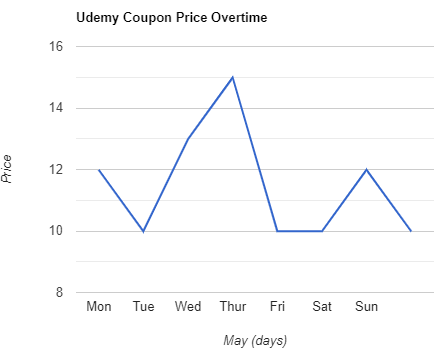Algorithms on Graphs
This specialization is a mix of theory and practice: you will learn algorithmic techniques for solving various computational problems and will implement about 100 algorithmic coding problems in a programming language of your choice. No other online course in Algorithms even comes close to offering you a wealth of programming challenges that you may face at your next job interview. To prepare you, we invested over 3000 hours into designing our challenges as an alternative to multiple choice questions that you usually find in MOOCs. Sorry, we do not believe in multiple choice questions when it c
Created by: Alexander S. Kulikov
 Quality Score
Quality Score
Content Quality
/
Video Quality
/
Qualified Instructor
/
Course Pace
/
Course Depth & Coverage
/
Overall Score : 90 / 100
 Live Chat with CourseDuck's Co-Founder for Help
Live Chat with CourseDuck's Co-Founder for Help
Need help deciding on a data structures and algorithms course? Or looking for more detail on Alexander S. Kulikov's Algorithms on Graphs? Feel free to chat below.
Join CourseDuck's Online Learning Discord Community
 Course Description
Course Description
If you have ever used a navigation service to find optimal route and estimate time to destination, you've used algorithms on graphs. Graphs arise in various real-world situations as there are road networks, computer networks and, most recently, social networks! If you're looking for the fastest time to get to work, cheapest way to connect set of computers into a network or efficient algorithm to automatically find communities and opinion leaders in Facebook, you're going to work with graphs and algorithms on graphs.In this course, you will first learn what a graph is and what are some of the most important properties. Then you'll learn several ways to traverse graphs and how you can do useful things while traversing the graph in some order. We will then talk about shortest paths algorithms - from the basic ones to those which open door for 1000000 times faster algorithms used in Google Maps and other navigational services. You will use these algorithms if you choose to work on our Fast Shortest Routes industrial capstone project. We will finish with minimum spanning trees which are used to plan road, telephone and computer networks and also find applications in clustering and approximate algorithms.Do you have technical problems? Write to us: coursera@hse.ru
 Instructor Details
Instructor Details

- 4.5 Rating
 190 Reviews
190 Reviews
Alexander S. Kulikov
Alexander S. Kulikov is a research fellow at St. Petersburg Department of Steklov Mathematical Institute of the Russian Academy of Sciences and a visiting professor at University of California, San Diego. His scientific interests include algorithms for NP-hard problems and circuit complexity. In St. Petersburg, he runs Computer Science Club and Computer Science Center.





